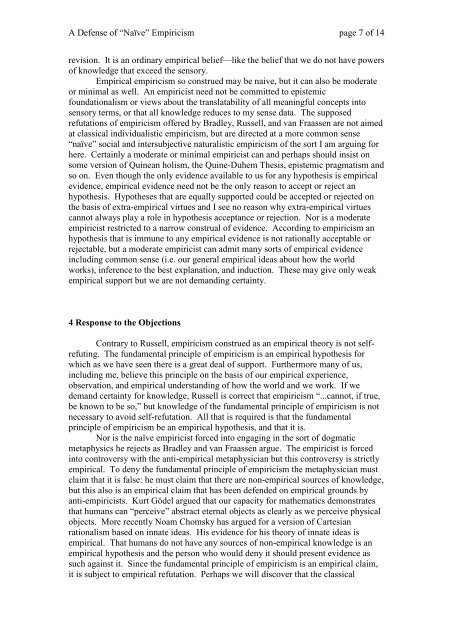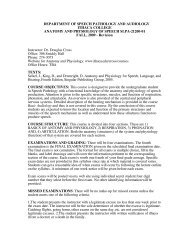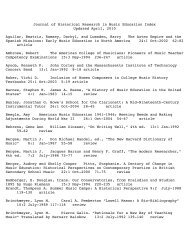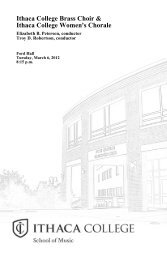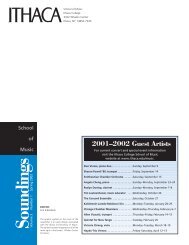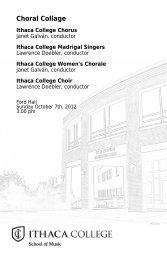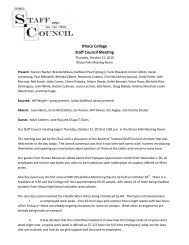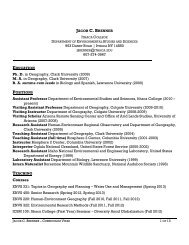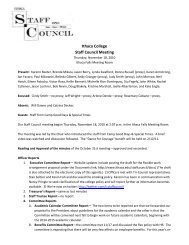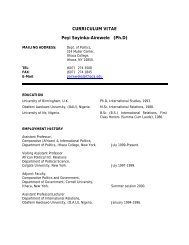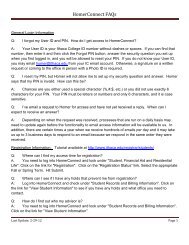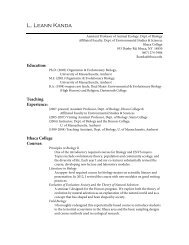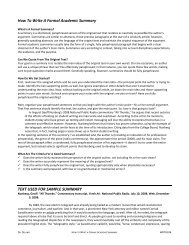A Brief Defense of Empiricism - Ithaca College
A Brief Defense of Empiricism - Ithaca College
A Brief Defense of Empiricism - Ithaca College
Create successful ePaper yourself
Turn your PDF publications into a flip-book with our unique Google optimized e-Paper software.
A <strong>Defense</strong> <strong>of</strong> “Naïve” <strong>Empiricism</strong> page 7 <strong>of</strong> 14<br />
revision. It is an ordinary empirical belief—like the belief that we do not have powers<br />
<strong>of</strong> knowledge that exceed the sensory.<br />
Empirical empiricism so construed may be naive, but it can also be moderate<br />
or minimal as well. An empiricist need not be committed to epistemic<br />
foundationalism or views about the translatability <strong>of</strong> all meaningful concepts into<br />
sensory terms, or that all knowledge reduces to my sense data. The supposed<br />
refutations <strong>of</strong> empiricism <strong>of</strong>fered by Bradley, Russell, and van Fraassen are not aimed<br />
at classical individualistic empiricism, but are directed at a more common sense<br />
“naïve” social and intersubjective naturalistic empiricism <strong>of</strong> the sort I am arguing for<br />
here. Certainly a moderate or minimal empiricist can and perhaps should insist on<br />
some version <strong>of</strong> Quinean holism, the Quine-Duhem Thesis, epistemic pragmatism and<br />
so on. Even though the only evidence available to us for any hypothesis is empirical<br />
evidence, empirical evidence need not be the only reason to accept or reject an<br />
hypothesis. Hypotheses that are equally supported could be accepted or rejected on<br />
the basis <strong>of</strong> extra-empirical virtues and I see no reason why extra-empirical virtues<br />
cannot always play a role in hypothesis acceptance or rejection. Nor is a moderate<br />
empiricist restricted to a narrow construal <strong>of</strong> evidence. According to empiricism an<br />
hypothesis that is immune to any empirical evidence is not rationally acceptable or<br />
rejectable, but a moderate empiricist can admit many sorts <strong>of</strong> empirical evidence<br />
including common sense (i.e. our general empirical ideas about how the world<br />
works), inference to the best explanation, and induction. These may give only weak<br />
empirical support but we are not demanding certainty.<br />
4 Response to the Objections<br />
Contrary to Russell, empiricism construed as an empirical theory is not selfrefuting.<br />
The fundamental principle <strong>of</strong> empiricism is an empirical hypothesis for<br />
which as we have seen there is a great deal <strong>of</strong> support. Furthermore many <strong>of</strong> us,<br />
including me, believe this principle on the basis <strong>of</strong> our empirical experience,<br />
observation, and empirical understanding <strong>of</strong> how the world and we work. If we<br />
demand certainty for knowledge, Russell is correct that empiricism “...cannot, if true,<br />
be known to be so,” but knowledge <strong>of</strong> the fundamental principle <strong>of</strong> empiricism is not<br />
necessary to avoid self-refutation. All that is required is that the fundamental<br />
principle <strong>of</strong> empiricism be an empirical hypothesis, and that it is.<br />
Nor is the naïve empiricist forced into engaging in the sort <strong>of</strong> dogmatic<br />
metaphysics he rejects as Bradley and van Fraassen argue. The empiricist is forced<br />
into controversy with the anti-empirical metaphysician but this controversy is strictly<br />
empirical. To deny the fundamental principle <strong>of</strong> empiricism the metaphysician must<br />
claim that it is false: he must claim that there are non-empirical sources <strong>of</strong> knowledge,<br />
but this also is an empirical claim that has been defended on empirical grounds by<br />
anti-empiricists. Kurt Gödel argued that our capacity for mathematics demonstrates<br />
that humans can “perceive” abstract eternal objects as clearly as we perceive physical<br />
objects. More recently Noam Chomsky has argued for a version <strong>of</strong> Cartesian<br />
rationalism based on innate ideas. His evidence for his theory <strong>of</strong> innate ideas is<br />
empirical. That humans do not have any sources <strong>of</strong> non-empirical knowledge is an<br />
empirical hypothesis and the person who would deny it should present evidence as<br />
such against it. Since the fundamental principle <strong>of</strong> empiricism is an empirical claim,<br />
it is subject to empirical refutation. Perhaps we will discover that the classical


